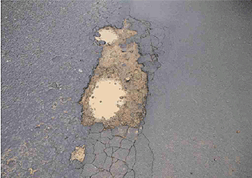BAD DRIVING, AND NOT POTHOLES, CAUSES ROAD DEATHS
 |
|
A survey has confirmed South African drivers are the world's worst. The
results of an international study conducted in 10 countries last year was
presented to the Conference on Injury Prevention and Safety Promotion in Durban
recently, and South Africa ranked highest for "aggressive and/or threatening
behaviour".
According to the research there are at least 18 000 road deaths in our country
each year - twice the number of deaths per 100 000 cars than the world average. |
These research results have merely confirmed what we at the KwaZulu-Natal
Department of Transport have always been saying, and therefore we prefer to use
the term "road crash" instead of "road accident". Basically we are killing
ourselves on the roads through bad driving, bad road behaviour and poorly
maintained vehicles.
THE RESEARCH DID NOT FIND THAT POTHOLES WAS A MAJOR CONTRIBUTORY FACTOR TO
ROAD CRASHES.
The decline in maintenance expenditure on national and provincial roads in South
Africa started in the 1970's and KwaZulu-Natal was no exception. The true extent
of neglect in rural areas only became evident after the abolition of the
self-governing territory of KwaZulu and the full integration of KZN during 1994.
Fortunately, through the intervention of the new government this negative
funding trend is being reversed.
After 1994 the KwaZulu-Natal Department of Transport inherited roads from a
number of road authorities in the province, the bulk of which was the 14 700
kilometre network of well-documented provincial roads. Information on the other
roads was somewhat less well defined. The challenge facing the Department of
Transport was to remedy the road network inequalities that arose out of an old
government policy of separate development, while at the same time maintaining
the primary road network at an appropriate level.
The Department of Transport adopted a data-driven approach to developing and
managing the provincial road network. Some of the notable achievements over the
past few years include:
- In 1996 the 'Community Access Roads Needs Study' established and
entrenched a consultative forum and identified important community access
roads that qualified for inclusion in the provincial road network. 11 400
kilometres of roads were documented and this was a first attempt at
quantifying the rural accessibility backlog. 30 democratically elected Rural
Road Transport Forums were set up across the province to inform the
Department of Transport of road upgrading needs and priorities.
- In 1998 the 'Road to Wealth and Job Creation Initiative' was presented
at the national Job Summit and this raised the awareness of roads as a
preferred option for social and economic development.
- In 1999 the 'Road Needs Assessment Study' highlighted the imbalance in
the provincial road network and quantified the financial requirements for
achieving a minimal equity network. Criteria for classifying roads on a more
equitable basis were reviewed and a large number of community access roads
and agricultural roads were found to meet the necessary criteria for
classification as either district or local roads. This was seen as the first
step in moving towards a cost effective and balanced road network for the
province.
- In 2001 the 'African Renaissance Roads Upgrading Programme' (ARRUP) was
launched with the primary objective of addressing the backlog in the
construction of blacktop roads. The Department identified strategic
transportation corridors that provided access to rural areas with high
development potential and is upgrading these gravel roads to blacktop
standard.
- Also in 2001 the KwaZulu-Natal Provincial Roads Act (Act 4 of 2001) was
enacted. The Act recognised that the provincial road network and the
classification of roads was a reflection of past priorities and was neither
equitable nor just. The Act provides the legal framework for declaring a new
provincial road network.
The Department has committed itself to the provision of a balanced road
network that is both equitable, sustainable and will maximize social and
economic development. The importance placed on the provision of a safe,
equitable and balanced road network can be best illustrated by the fact that 76%
of the department's budget is set aside for this function.
This budget aims to strike a balance between the construction of roads to
provide access roads and corridors for the areas previously disadvantaged by the
policy of separate development and the need to maintain the existing road
network to an acceptable standard.

 back back
|
